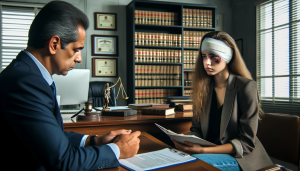Understanding Personal Injury Case
Recognizing Personal Injury
Personal injury refers to harm or damage inflicted upon an individual's body, mind, or emotions as a result of another person's negligence or harmful actions. It does not cover damage to property. In the legal context, these injuries often result from accidents such as car crashes, slip and falls, medical malpractice, or workplace incidents.Key Elements In A Personal Injury Case
A personal injury case is usually based on the doctrine of negligence. To prove negligence, the injured party (the plaintiff) must establish four elements. Firstly, the defendant owed a duty of care to the plaintiff. Secondly, the defendant breached that duty of care. Thirdly, this breach was the direct cause of the plaintiff's injury. Lastly, the plaintiff suffered damages (such as medical costs, lost wages, or pain and suffering) as a result of the injury.The Importance of Evidence
In any personal injury case, providing strong evidence is critical to establish fault and determine the extent of damages. This can include medical records, police reports, witness testimonies, and any relevant photographs or videos. Documentation of all expenses related to the injury should also be kept for potential reimbursement.Role of Insurance Companies in Personal Injury Cases
Typically, if you are hit by someone who doesn't want to pay, their insurance company is responsible for compensating you. It's their duty to reimburse for damages, including medical bills, property damage, and other losses. However, it's important to note that insurance companies often seek to minimize payouts, which is why having a solid personal injury case and possibly legal representation can be beneficial.The Process of a Personal Injury Lawsuit
If settlement with the insurance company isn’t possible, a lawsuit might be necessary. The process generally starts with the filing of a complaint, followed by the discovery phase where both sides investigate the particulars of the case. This can lead to a trial if no agreement is reached beforehand. It's vital to understand your state’s statute of limitations, which is the deadline for filing a personal injury lawsuit.The Importance of Getting Legal Help
Understanding Your Legal Rights
In the aftermath of a collision where the at-fault party refuses to pay, understanding your legal rights is essential. It's important to remember that everyone has the right to compensation if they've been wronged or injured due to someone else's negligence. An experienced legal professional can help you understand this complex landscape, and guide you on how to best protect and assert your rights.Assessing the Full Extent of Damages
Legal professionals specialize in evaluating and estimating the full extent of damages after an accident, which may include not only vehicle repairs but also medical expenses, pain and suffering, lost wages, and more. An attorney can help ensure you're not shortchanged and that you receive fair compensation for all you've endured.Navigating Insurance Companies and Legal Proceedings
Insurance companies usually aim to minimize the payout, and without legal help, you might find yourself accepting a settlement far below what you deserve. Furthermore, the legal proceedings involved in such cases can be complex and riddled with pitfalls for the unwary. A lawyer will represent your best interests, negotiate on your behalf, and if necessary, take your case to court.Overcoming Legal Loopholes
Law is often nuanced with many potential loopholes which the opposing party may try to exploit to avoid paying. Having a lawyer by your side can help sidestep these traps, ensuring that the guilty party cannot escape their obligations due to legal technicalities.Providing Peace of Mind
Lastly, having legal assistance brings peace of mind. Knowing that a competent professional is handling your case can relieve a lot of stress associated with these unfortunate incidents. This allows you to focus on what matters most: your recovery and wellbeing.How to Deal with Insurance Companies
Understanding Your Insurance Coverage
Before any incident occurs, it's important that you understand the details of your insurance policy. Know what is covered and what isn't, as well as the claim limits of your policy. A deep understanding of your policy can equip you with knowledge that may be crucial when negotiating with insurance companies.Reporting the Incident to Your Insurance Company
Once an accident has occurred, regardless of who is at fault, it's important to notify your insurance company as soon as possible. Provide them with all the necessary details about the accident. This includes date, time, location, and the parties involved. Be prepared to provide them with the police report, photographs of the accident scene, and any other relevant evidence.Gathering Evidence and Documentation
Evidence is crucial when dealing with insurance companies. Therefore, make sure to gather all the necessary information that can strengthen your case. This includes photos from the scene, witness statements, and medical reports if injuries are involved. All these documents will play an essential role in establishing the facts of the incident which can work to your advantage.
Navigating the Insurance Claims Process
The claim process often involves a lot of paperwork and can be complex. It usually starts with the insurer assessing the damage to your vehicle, after which they will decide whether your car will be repaired or declared a total loss. In this stage, it's essential to stay patient and cooperate fully with the insurance adjuster. However, it's also crucial to keep in mind that the adjuster works for the insurance company and their initial offer may not be the best or final one.Seeking Legal Advice
If the party at fault does not want to pay, and you encounter difficulties with the insurance company, consider seeking legal advice. A lawyer can provide guidance on how to deal with insurance companies and how to negotiate a more favorable settlement. They can also help if you need to take the case to court.Gathering Evidence for Your Claim
In the event that someone hits you and refuses to pay for the damages, it's crucial to gather substantive evidence to support your claim. This can be a daunting task, especially if it's your first time dealing with such an issue, but with the right approach and organized effort, you can present a solid case.Documenting the Incident
Start by documenting the incident as thoroughly as possible. This includes jotting down all the details of the accident, like date, time, and location. If there were any witnesses, their statements could be vital; make sure you collect their contact information. Don't forget to record the other party's details as well, like name, contact information, and vehicle registration number.Photographic Evidence
In the digital age, a picture is more than just worth a thousand words. Photographs provide a clear visual representation of what happened. Take several photographs from different angles, focusing on the damage to both vehicles. Also try to capture the surroundings, including traffic signals, signs, or any specific landmarks that might contribute to your evidence.Gathering Official Reports
Official reports can play a crucial role in substantiating your claim. Call the police immediately after the accident and ensure that they issue a formal report. This report will contain an unbiased account of the incident and can be a significant piece of evidence in your favor. If you were injured, obtaining a detailed medical report that outlines the extent and nature of your injuries is equally important.Legal Assistance
Last but not least, consider reaching out to a lawyer as soon as possible. They would be able to guide you on the kind of evidence required and its legal relevance. Plus, they'll assist you in preserving and presenting the evidence in an acceptable and organized manner. An experienced lawyer can also help if you need to escalate the matter to court.Negotiating with the Offending Party
Establishing a Dialogue
First and foremost, it is important to establish an open line of communication with the offending party. The very initial step should be attempting to discuss the situation calmly and objectively, focusing on the facts. Express your perspective and make attempts to understand theirs as well. This paves the way for a more successful negotiation process.Documenting the Damages
Before initiating a negotiation, it's crucial to document all damages professionally and comprehensively. This includes pictures of the car damage, medical bills (if any), and estimated repair costs from at least two independent sources. Furthermore, if there are any witnesses, their testimonies can also offer supporting evidence. By having tangible proof, you bolster your position during negotiations.Presenting the Evidence
Once you have accumulated all necessary documentation, present this to the offending party. The aim here isn’t to intimidate, but to produce an objective understanding of the extent of the damages, and why you believe they should assume financial responsibility. Make sure you're clear about how each piece of evidence supports your case.Finding a Common Ground
Understanding that the offending party may not agree initially to cover all damages is important. Be ready for counterarguments or lower offers. Finding a common ground might require some flexibility from both sides. Be open to a reasonable compromise while standing firm against gross under compensation.Seeking Legal Assistance
If negotiations aren't going smoothly and the offending party remains unwilling to pay, don't hesitate to seek legal advice or involve your insurance company. In the worst-case scenario, you may have to resort to litigation to get compensated. However, keep in mind that legal battles can be time-consuming and costly, so use them as last resorts after exhausting other avenues of negotiation.Initiating a Lawsuit as a Last Resort
Understanding the Basics of a Lawsuit
When all other attempts at resolution have failed, it could be time to consider initiating a lawsuit. Before proceeding, it's vital to understand what this entails. A lawsuit is a legal action taken by a party against another in a court of law. In this case, you (the plaintiff) will be taking legal action against the individual who hit you (the defendant). It's recommended to consult with a professional attorney to walk you through the specifics.Seeking Legal Advice
Engaging an expert in accident and injury law should be your initial step before filing a lawsuit. An attorney can help you understand the strength of your case, explore your legal options, and give you a clear understanding of the potential costs and benefits. It's also crucial to note that the choice to file a lawsuit should be informed more by the facts of your case than by your emotions.Preparing Your Case
Once you decide to sue, you'll need to gather all necessary evidence. This includes photos of the accident scene and damages, medical reports, witness statements, and any other documentation that supports your claim. Your attorney will guide you in preparing the most compelling case possible, ensuring all documentation is gathered and properly prepared.Filing the Lawsuit
The formal initiation of your lawsuit begins by filing a complaint or petition with the appropriate court. This document outlines your case against the defendant: who you are, why you're suing them, and what compensation you're seeking. Ensure to follow all court rules and procedures during this process, or consider hiring a lawyer to handle these technical aspects for you.Managing the Legal Process
Once the lawsuit is initiated, be prepared for a lengthy process. Depending on the complexity of your case and the willingness of the other party to settle, a lawsuit might take months or even years to conclude. Understand that patience and resilience are vital during this period. Always remember, a lawsuit should be treated as a last resort after all other efforts to recoup financial damages have been exhausted. It's always advised to attempt negotiation, mediation or arbitration before pursuing the legal path.Precautions to Avoid Future Disputes
Keeping Detailed Records
In the event of any accident, ensure to gather as much evidence as you can right at the scene. This would include taking photos or videos of the damages, the other vehicle's license plate, and other relevant details such as the weather and location. If there are any witnesses to the incident, try to obtain their contact information as well. Keep track of medical visits, treatments, and any related expenses.Prompt Insurance Notification
Immediately following the incident, it's key to inform your insurance company about the accident. Provide them with all the gathered information and cooperate fully in their investigation. Remember, delaying this step may subsequently lead to complications when claiming from the insurance company.Understanding Your Insurance Policy
It's crucial to fully understand your own insurance policy. You need to be aware of what it covers, the procedures for filing a claim, and what to expect during the process. If you're unsure, don't hesitate to ask your insurance agent for clarification. In some situations, your insurance company might cover the damage costs initially and later on recover the same from the at-fault party's insurer.Legal Representation
Obtaining legal representation can provide a safeguard against future disputes. Attorneys who specialize in personal injury or car accidents are familiar with the laws relevant to your situation and can advocate on your behalf. They can help negotiate a settlement, represent you in court, and ensure you receive fair compensation.Documenting Communication and Agreements
Maintain a record of all communication between yourself, the other party involved, insurance companies, and any legal representatives. Keep any agreements, like promises of payment, in written form whenever possible. Always validate that the other party has received and acknowledged any sent documents. This will make it difficult for them to deny their obligations later on and helps to protect you against potential disputes.Conclusion
Dealing with a situation where someone has hit you and refuses to pay can be challenging, but by following the steps outlined in this article, you can navigate the process effectively. Remember to prioritize safety, gather information, involve the authorities, and if necessary, seek legal assistance. Don't let someone else's actions leave you with a financial burden. Look for an attorney who has the right legal resources for your legal needs.Contact us here on the Warmuth Law website or through our hotline 888-517-9888.












